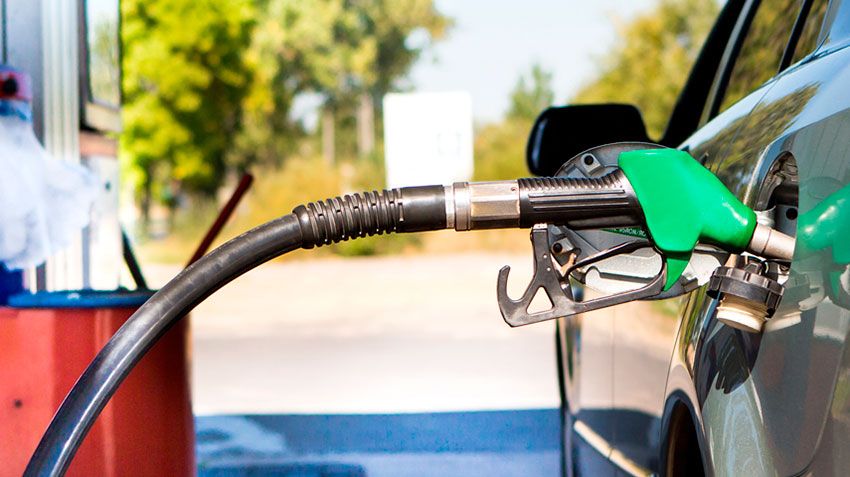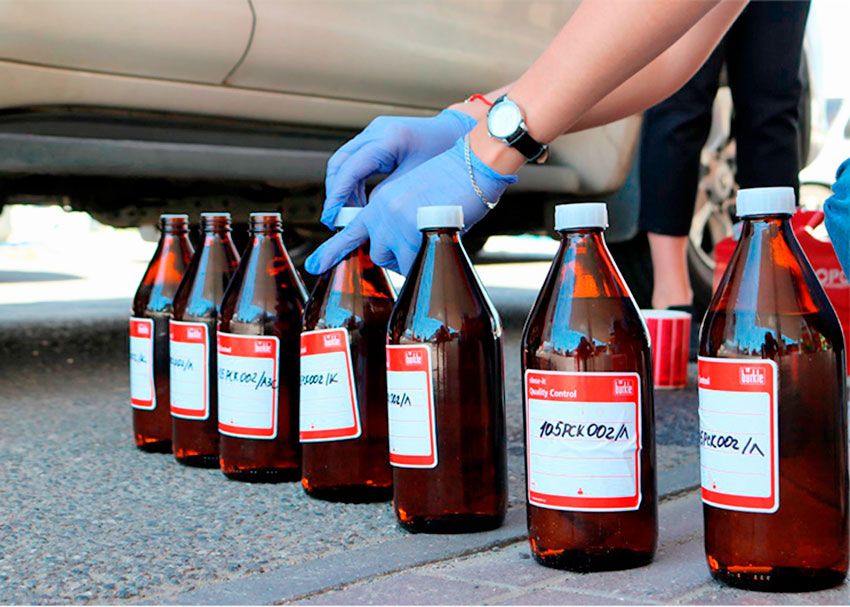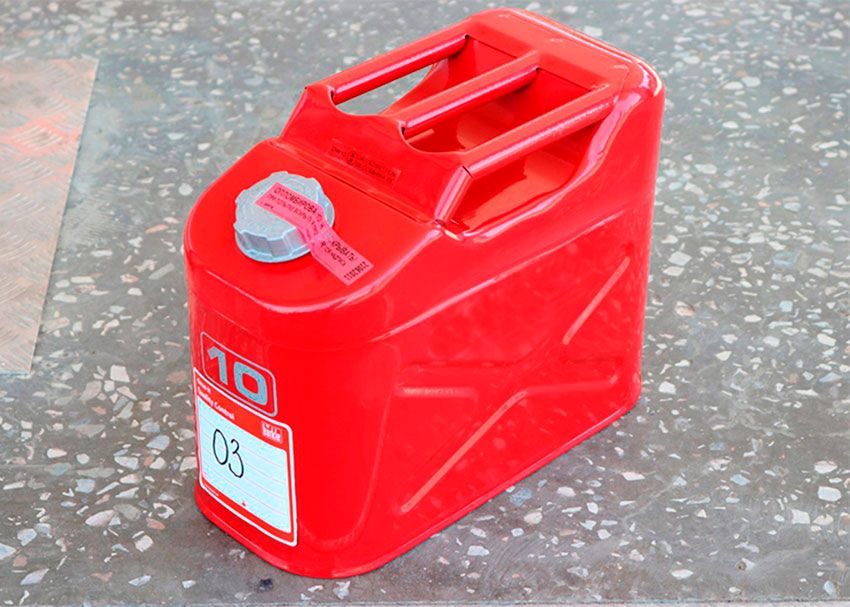"Roskoshestvo" instructed to look into the quality of fuel in the country

7 February 2019
The first "under the hand" got "the blenders" of Stavropol
In 2018, the Autonomous non-commercial organization "Roskoshestvo" together with the Ministry of industry and trade and under the agreement with the Federal Agency for technical regulation and Metrology "a" commissioned a project on quality assurance the most popular in the country of gasoline AI-92. Honor to assume "pilot strike" project took the Stavropol Krai, where they covered six dozen gas stations. Naturally, in this research the quality of gasoline on the ground would be extended to other regions of Russia.
Rosstandard has accurate data that falsified the gasoline gets to the gas station from bases of supply, a considerable number of fruitful, in particular, on the territory of the North Caucasian Federal district. Under the control of the researchers included gasoline with a 26 network of filling stations (OAO "Gazprom", JSC "NK "Rosneft", PJSC "LUKOIL", OOO "South oil company" PKP "Studiomaple", YuTK, OOO, OOO "the Company "Astra" LTD "Stavneft'") and 34 private gas stations in Stavropol region.
In accordance with the approved standards and Standards gasoline was subjected to all the provisions of the research 31 the indicator of quality and safety. In particular, the experts checked the fuel line with mandatory requirements, established by the technical regulations of the Customs Union (TR CU 013/2011 "On requirements to automobile and aviation gasoline, diesel and ship fuel, fuel for jet engines and fuel oil"), requirements of GOST 32513-2013 "motor Fuel. Gasoline unleaded. Technical conditions", as well as environmental and operational factors.
And what? The results confirmed the well-known trend – from sellers of the big box less violations, although also occur, but small private "Antonelliana" (just like the very black sheep of Proverbs – ed.) extremely spoil the picture – in fact "dreaming" as if to fool buyers of fuel, with all the obvious and not so a set of fraud and other scams.
The Minister of industry and trade of Russia Denis Manturov in this regard, reported that: "studies of the quality of motor fuel have confirmed that only in seven cases out of 60 were identified violations of the mandatory requirements. Most of the samples with violations procured at small gas stations to private entrepreneurs. The study also showed that the fuel at a price lower than the network of the gas station, inferior to the quality of petrol large petrol stations. Information on violations was submitted to Rosstandart, which has already begun appropriate actions to adopt in relation to infringers of measures of administrative influence, until the imposition of "turnover" fines."
One of the most notorious outcome of the study was the conclusion that the most widespread violation is the failure order of circulation of fuel in the market that started to emerge already at the initial stage of procurement of samples by the expert Associations. So, at 28 filling stations operators are unable to present a passport copy fuel, actually confirming the quality of gasoline, which is a violation of the technical regulations (article 3 of the TR CU). From "sinners" often came across the traders (4 network of filling stations, 11 stations of the form of ownership, the gas station 13 forms of ownership of IP). Well, where copies of the passports had a one – third were "rotten", i.e. overdue (12 stations).
Naturally, the tests were carried out in accredited testing laboratories and in full compliance with the guidelines of Rosstandart on "the organization and conduction of public control, partnership and mutual cooperation in the sphere of the fuel market". Of the study samples by standard methods was conducted on attorneys, the means of measurement and, of course, the certified test equipment.
The head of "Rockafella" Maxim Protasov, said: "under the agreement, Roskoshestvo and Rosstandart was tested guidelines Supervisory body for monitoring the quality of fuel at filling stations. After conducting sampling and research Roskoshestvo sent information about the detected violations in Rosstandart. This is a great example of combining cutting-edge methodologies controller and high-precision research principles of Roskoshestvo. And we intend to develop cooperation in this direction. The effectiveness of such collaborations have already proven world experience."
All motorists know that the key operational indicator of the quality of gasoline is considered to be pure octane, which characterizes the resistance of gasoline to ignite under compression in the cylinder – higher number allows you to create more compression without detonation, and thus to increase the capacity and the efficiency of the engine and the vehicle as a whole. The octane number is specified in the standards or technical conditions of fuel, gasoline AI-92 have to show on a research method not less than 92 units, and not less than 83 units according to motor method (which, by the way, uses a special single-cylinder internal combustion engine with variable displacement volume – ed.).
In turn, the discrepancy between the octane number of the declared class according to the head of testing laboratory "ONCO-VNII NP" Alexander gordeno leads to increased fuel consumption and reduced engine efficiency and even the destruction of the piston engine (which is especially important for modern high-powered motors actually, regardless of the size of their working volume – ed.). So, the study showed that only private filling stations (IP Podolny R. Y. from the city of Georgievsk) did not survive the conformity of the declared fuel octane. A decent result?
Unfortunately, "the devil is in the details" – in addition to by itself octane fuel in our time almost equally important such characteristics as the concentration of oxygenates – methanol, ethanol, isopropyl alcohol, tert-butyl alcohol, isobutyl alcohol, esters and others. These components extend the functionality of the gasoline (including the facilitation of engine start at low temperatures – ed.), and sometimes even improve its customer quality, for example, fuel with these additives shows significantly better cleaning properties and combustion characteristics, and combustion, it forms less carbon monoxide and hydrocarbons (i.e., radically greener than the straight-run and cracked gasolines of the last century – ed.). So, here are the results of the study, the concentration of these oxygenates were detected on 5 private filling stations (IP Amaev A. M. (town of mikhaylovsk), SP Ghazaryan R. V. (Stavropol), two SP Amieva D. M. (Stavropol), as well as the SP Magomedov M. D. (the city of Ipatovo). Although, oxygenates, and can cause engine malfunction, but not included in the list of prohibited additives.
And still – derived from the content of the oxygenates is the oxygen, too much content which provokes the malfunctioning of the sensors, air flow and leads to excessive oxidation of the expensive parts of the fuel system. According to the technical regulations, the mass fraction of oxygen in the fuel should not exceed 2.7 percent (the standard is set for the accepted in Russia of gasoline of environmental class K3, K4 and K5). The study noted the increased oxygen content on 3 private filling stations (IP Ghazaryan R. V. (Stavropol) and two SP Amieva D. M. (Stavropol).
Another well-known today, the harmful component of gasoline acts as a sulfur excess on the contents of which (over 500 mg/kg), causing a reduction in the service life of engine oil and the fuel injectors (and just destroys catalytic converters from K4 and above – ed.) it was revealed in the gasoline at 7 filling stations, of which six were private (IE Fetisova S. A. (Mineralnye Vody), SP Podolny R. Y. (Georgievsk), SP Ghazaryan R. V. (Stavropol), SP Amieva A. M. (town of mikhaylovsk), SP Magomedov M. D. (the city of Ipatovo) and two SP Amieva D. M. (Moscow)), but it was one network.
But the experts "Rockafella" was not found in the gasoline composition of mechanical impurities and water, of course, also very adversely affecting the operation of the engine.
In this regard, recall the story of how three decades ago (during the Soviet deficit of anything and everything) in Togliatti VAZ-native would-be innovators have started successfully (Oh, the power of garage myths!) install on your own (!) "Lada" water injection, but sinonome a few percent in gas mileage, was soon faced with total corrosion of mirrors of cylinders, having thus much more expensive than the saved fuel "kapitalku" engines.
Also, no violations were detected on the fractional composition of fuel, including excess levels of lead, manganese and iron, compliance to standards proportion of monomethylaniline, benzene, aromatic and olefin hydrocarbons, with direct impact on environmental damage from harmful exhaust emissions.
In addition, the fuel according to GOST are applied-and environmental demands for reducing its harmful impact on the environment, which requires the use of sealed equipment as in the production (refinery) and during transport of petrol and storage. At the same process conditions should be maintained strictly and carrying out various manipulations with gasoline must be provided with measures to prevent it from getting into sewage, surface waters and soil. The permissible amount of harmful substances emitted into the atmosphere, as well as control over their content sets GOST 17.2.3.02-78.
From 1 July 2016, Russia for the protection of the environment switched to use fuel of environmental standard Euro 5, involving a fivefold reduction in this fuel compared to the standard Euro 4 sulphur compounds and the reduction of the total emissions.
According to "Rosstandart", the proportion of violations in the physical-chemical characteristics of the fuel by 2018 fell to 9%. For example, the network of filling stations it amounted to about 3.5%, and among "independent" non-chain gas stations – 22%.
Improvement "Rosstandart" relates to the introduction of new oversight mechanisms on the market and joint working with the unions and bona fide market participants, which allowed to establish mechanisms of internal control the quality of traded fuels.
the following are the main problems (according to "Rosstandart") faced by motorists at filling stations:
– At the gas station can pour the gasoline of a lower grade: for example, AI-80 instead of AI-92.
– Characteristics of the gasoline is adjusted to higher levels by adding the banned anti-knock additive that increase the octane number.
– Gasoline is diluted with water to obtain a greater volume of product for sale.
– Gasoline is often dirty, it often contains various harmful impurities.
whether Justified concerns of consumers justified?
Tests showed that at gas stations can really sell gasoline with an octane rating that does not match the declared class, but this violation was identified for only one of the purchased samples, and incorrect or excessive antiknock additives, oxygenates, i.e., although they were discovered (see above), but the ban did not fall. No water, no mechanical impurities in the samples is not detected. The high content of sulphur detected in seven samples, not only affects the normal vehicle operation, but also has a negative impact on the environment. Information about the violations identified "Rascacielos" was submitted to Rosstandart, which has already initiated its own checks.
still, the most important external factor that helps to avoid trouble with the quality of gasoline is its retail price at purchase samples the lowest prices were recorded just on the "left" stations: the cheapest petrol in ₽41,9 per liter realized at the gas station SP Ayasegawa L. A. in Novopavlovsk.
On network same gas station prices were mostly higher as well, the most expensive gasoline was sold at gas stations "Bashneft" in the Kursk region ₽of 45.7 per liter.
What to do if the gas station refueled with bad gasoline?
Despite a relatively low share of falsification in the automotive fuels market, likely to run into it is still far from hypothetical. Thus, according to the head of Federation of automobile owners of Russia, member of Public Council at the Rosstandart Sergey Kanaeva in the event of damage of the car precisely because of the poor quality of fuel to prove exactly the root cause, the car owner will be extremely difficult: "we Need to do the examination and apply to the Rosstandart. And if the driver left the gas station where he sold poor quality gasoline, the procedure becomes even more complicated because you will have to prove that the fuel caused the failure, it was bought there and not at some other gas station. This will require the holding of another examination for the presence of various impurities and additives. Easier to make repairs of the car".

A sample of fuel is carried out only in such are a certified bottle
If the driver has not had time to go to the petrol station (I wonder how does he find out that the car actually started any problems? – ed.) it is necessary to ask the operator of the probe of gasoline, which is required for examination, so as to carry out the selection of fuel in accordance with the approved Rosstandart rules is almost impossible: "Because self-sampling is necessary, first, to carry all the necessary equipment – a special container, funnel, and so on – and, secondly, to comply with the order, specified in the methodological recommendations", pocherkivaet Sergei Kanayev. Curious refer directly to the website of "Rosstandart".
Only such a measuring canister is sealed and can provide the legal right of the consumer, both in quality and quantity of fuel. But one of ordinary motorists it is?
PS My opinion – such a procedure, with all its technological correctness essentially protects the seller, not the buyer. So protect yourself: don't skimp on price of gasoline – engine repair will cost more! In any case, keep the receipt for the purchase of fuel to the next gas station.
P. P. S. Recently, the editors of "AR" conducted a similar investigation of editorial quality winter diesel fuel (currently every 10th car in the country for diesel) – the conclusions are strikingly similar to the study of "Rockafella": swill from a mixture of the summer with marine diesel fuel and furnace (until recently, their implementation at the gas station was not prohibited) to allow only brick and mortar "independent" station, so here the same output as "fear of the brick and mortar SP freebies offering". Another issue is that other way many "IP-shnyh" station simply no, as ever-increasing wholesale prices of fuel robs them of even a minimal profit. But, ladies and gentlemen motorists and car owners tell me honestly – you should take their problems or their own cars? So let me repeat: if a miser pays twice, in the case of suspiciously cheap gasoline and diesel fuel, it can pay many times more..
|
|
|
Element was not found.








